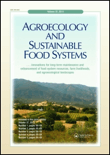
Agroecology and Sustainable Food Systems
metrics 2024
Championing sustainability in food systems worldwide.
Introduction
Agroecology and Sustainable Food Systems, published by Taylor & Francis Inc, is a premier academic journal dedicated to advancing the science of agroecology and its applications in sustainable food systems. With an impact factor that reflects its significant influence in the field, this journal serves as a vital resource for researchers, industry professionals, and students engaged in sustainability, agriculture, and environmental studies. As of 2023, it proudly holds a Q1 ranking in Agronomy and Crop Science, as well as Q2 rankings in Development and Renewable Energy, Sustainability, and the Environment categories. Covering a broad spectrum of topics, it not only shares peer-reviewed research but also encourages discourse on innovative practices and policies that enhance food security and ecological balance. Available for access through various options including Open Access, the journal's commitment to knowledge dissemination is further underscored by its substantial rankings on Scopus, with notable percentiles across multiple disciplines. By focusing on agroecological principles and their socio-economic implications, Agroecology and Sustainable Food Systems is essential for those looking to stimulate meaningful change in agricultural practices and sustainability initiatives worldwide.
Metrics 2024
 0.63
0.63 2.40
2.40 3.30
3.30 56
56Metrics History
Rank 2024
Scopus
IF (Web Of Science)
JCI (Web Of Science)
Quartile History
Similar Journals
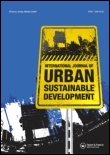
International Journal of Urban Sustainable Development
Shaping policies for a greener, smarter urban landscape.The International Journal of Urban Sustainable Development is a premier peer-reviewed journal published by Taylor & Francis Ltd, dedicated to advancing knowledge in the field of urban sustainability. With an ISSN of 1946-3138 and an E-ISSN of 1946-3146, this journal has gained recognition for its high-quality research, attaining Q1 status in multiple categories including Development, Geography, Planning and Development, and Urban Studies, per the 2023 category quartiles. Open Access since 2022, the journal ensures that groundbreaking research is widely accessible to scholars, practitioners, and policy-makers alike, enhancing its reach and impact. Operating from the United Kingdom, it focuses on a diverse array of topics related to urban environments and sustainable practices, supporting innovation and policy development. As a result, the journal holds significant placements in Scopus rankings, notably ranking #62 in Urban Studies, underscoring its pivotal role in shaping the future of sustainable urban development globally.
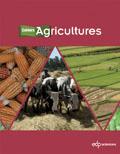
CAHIERS AGRICULTURES
Fostering collaboration for a sustainable agricultural landscape.CAHIERS AGRICULTURES is a distinguished open-access journal published by EDP Sciences S A, focusing on the vital fields of Agronomy and Crop Science, Animal Science and Zoology, as well as Management, Monitoring, Policy, and Law. With an ISSN of 1166-7699 and an E-ISSN of 1777-5949, this journal has notably maintained a strong presence in the academic landscape since its establishment, covering a wide range of topics pertinent to agricultural sciences. Based in France, CAHIERS AGRICULTURES fosters collaboration and knowledge sharing among researchers and practitioners through its open-access model, which has been in effect since 2014. The journal is recognized for its rigorous peer-review process, reflected in its competitive Scopus rankings, which place it in the Q2 quartile for both Agronomy and Crop Science, and Animal Science and Zoology. Researchers and scholars are encouraged to contribute cutting-edge findings that may influence agricultural practices and policy development. With a vision to advance sustainable agricultural practices, CAHIERS AGRICULTURES stands as a critical resource for advancing scientific knowledge and informing stakeholders in the agricultural sector.
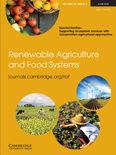
RENEWABLE AGRICULTURE AND FOOD SYSTEMS
Transforming food systems for a sustainable future.RENEWABLE AGRICULTURE AND FOOD SYSTEMS, published by Cambridge University Press, is a leading open-access journal dedicated to the advancement of sustainability in agricultural practices and food systems. With an ISSN of 1742-1705 and an E-ISSN of 1742-1713, this journal spans the interdisciplinary fields of agronomy and food science, achieving a commendable Q2 ranking in both categories for 2023. As it continues to converge through the years from 2004 to 2024, the journal offers a platform for researchers, professionals, and students to disseminate transformative research that addresses the challenges of food security, resource management, and environmental impact. The journal’s significant impact is underscored by its Scopus rankings, situating it in the 77th percentile among agronomy and crop science publications, and the 67th percentile in food science. Since becoming fully open access in 2023, RENEWABLE AGRICULTURE AND FOOD SYSTEMS promotes wider accessibility to vital research findings, fostering collaboration and innovation in the pursuit of sustainable agricultural practices and food systems worldwide.

Journal of Agriculture and Environment for International Development
Elevating Research for a Sustainable FutureJournal of Agriculture and Environment for International Development, published by AGENZIA ITALIANA COOPERAZIONE SVILUPPO-ITALIAN DEV COOP AGENCY, is a vital platform advancing research at the intersection of agricultural practices, environmental sustainability, and international development. Since its inception, this Open Access journal has aimed to disseminate knowledge and innovative strategies that address global challenges in the agri-environment sector. With ISSN 2240-2802, this esteemed publication is situated in Italy and has maintained an unwavering commitment to accessibility since 2011, encouraging widespread engagement amongst researchers and practitioners. Although currently ranked in the Q4 quartile across various categories including Agricultural and Biological Sciences and Environmental Science, the journal is dedicated to covering crucial topics that contribute to sustainable development, thus serving as an invaluable resource for scholars and policymakers alike. The convergence years from 2016 to 2024 reflect the journal's adaptive approach to evolving global trends, ensuring its relevance in a rapidly changing academic landscape.

Journal of Agriculture Food Systems and Community Development
Connecting Agriculture, Community, and InnovationJournal of Agriculture Food Systems and Community Development is a leading academic journal publishing high-quality research aimed at understanding the intersection of agricultural practices, food systems, and community development. Published by the Lyson Center for Civic Agriculture and Food Systems in the United States, this open access journal has been accessible to a global audience since 2010, enabling the free exchange of ideas and innovations in its field. With an ISSN of 2152-0798 and an E-ISSN of 2152-0801, the journal is recognized for its impactful contributions, holding a rank of Q2 in Geography, Planning and Development and multiple Q3 rankings across other relevant categories in 2023. By presenting interdisciplinary research that enhances the sustainability and resilience of food systems, this journal serves as an essential resource for researchers, professionals, and students who are passionate about making a positive impact on communities through agriculture and food-related initiatives. The journal's ongoing commitment to disseminating important findings underscores its role as a vital platform for advancing knowledge and practice in this critical area of study.

African Journal of Agricultural and Resource Economics-AFJARE
Bridging knowledge and practice in resource economics.African Journal of Agricultural and Resource Economics (AFJARE) is a dynamic publication dedicated to advancing the fields of agricultural and resource economics within the context of Africa. Published by the African Association of Agricultural Economists, this journal serves as a vital platform for researchers, professionals, and students to disseminate their findings and engage with contemporary issues affecting the agricultural sector across the continent. With an ISSN of 1993-3738 and an E-ISSN of 1993-3738, AFJARE aims to reach a wide audience through its commitment to open access, ensuring that crucial research is accessible to all. The journal has recently established itself in the academic landscape, achieving a Q3 ranking in Agricultural and Biological Sciences and a Q4 ranking in Economics and Econometrics for 2023. Covering a diverse scope from 2018 to 2023, AFJARE encourages submissions that explore innovative economic strategies and policies that can foster agricultural development and resource management in Africa. With its growing impact and relevance, AFJARE is poised to become a cornerstone in the discourse on agricultural economics in Africa and beyond.
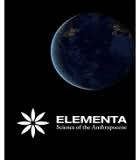
Elementa-Science of the Anthropocene
Connecting disciplines to address the challenges of our time.Elementa: Science of the Anthropocene is an esteemed Open Access journal published by University of California Press, dedicated to advancing interdisciplinary research that addresses the complexities of the Anthropocene epoch. Since its inception in 2013, it has established itself as a leading platform for the dissemination of innovative ideas across several disciplines, including atmospheric science, ecology, environmental engineering, geology, geotechnical engineering, and oceanography, achieving Q1 status in each of these fields as of 2023. With an impact factor reflecting its significant contribution to the scholarly community, Elementa ranks favorably in various Scopus categories, being placed in the 88th percentile in Earth and Planetary Sciences for both Geology and Oceanography. The journal's open-access model ensures that valuable research findings are accessible to a broader audience, fostering collaboration among researchers, professionals, and students dedicated to tackling pressing environmental challenges. Located in Oakland, California, Elementa continues to uphold a mission that underscores the importance of sustainable solutions and comprehensive understanding of the Anthropocene.

Food Security
Empowering Dialogue on Food SustainabilityFood Security is a premier academic journal dedicated to advancing knowledge and fostering dialogue surrounding the critical issues of food security and sustainability in a rapidly changing world. Published by Springer, this journal has established itself as a leading voice in the fields of Agronomy, Crop Science, Development, and Food Science, reflected in its impressive Q1 quartile rankings across these disciplines for 2023. With an impact factor showcasing its significant influence, Food Security is ranked in the top echelon of its domain, with notable positions in Scopus indices (Rank #7 in Agronomy and Crop Science, Rank #6 in Development, and Rank #13 in Food Science). Spanning articles from 2010 to 2024, the journal serves as a critical resource for researchers, professionals, and students seeking to address the complex interplay of agricultural practices, socio-economic dynamics, and environmental factors that contribute to food availability and accessibility on a global scale. While primarily subscription-based, Food Security ensures that its audience remains engaged with the latest research, policy discussions, and innovative solutions to combat food insecurity worldwide.

Agricultural and Food Economics
Transforming agricultural practices through economic analysis.Agricultural and Food Economics is a leading journal published by SPRINGERNATURE, dedicated to the advancement of research in the interconnected fields of agriculture, food systems, and economic analysis. Established in 2013 and operating under an Open Access model, this journal serves as a vital platform for scholars and practitioners to disseminate innovative findings and insights that influence policy and practice. With a notable impact reflected in its 2023 quartile rankings—Q1 in Agricultural and Biological Sciences (miscellaneous), Q2 in Economics and Econometrics, and Q1 in Food Science—this journal is recognized for its rigorous scholarly output. It ranks among the top resources in its domain, with Scopus ranks placing it in the 88th percentile for Agricultural and Biological Sciences and the 79th percentile for Economics. The journal covers a broad spectrum of topics, including sustainable agricultural practices, the dynamics of food markets, and the economic implications of food policies. Researchers, professionals, and students alike will find valuable insights and comprehensive analyses that contribute to the ever-evolving discourse on food and agriculture.

International Journal of Agricultural Sustainability
Connecting Research and Innovation for Global SustainabilityThe International Journal of Agricultural Sustainability, published by Taylor & Francis Ltd, is a leading platform for researchers and professionals in the field of agricultural science, economics, and sustainability. With an impact factor that reflects its strong academic credibility and contribution to the field, the journal has earned esteemed rankings, including Q1 in Agronomy and Crop Science and Q2 in Economics and Econometrics for 2023. Engaging an audience keen on advancing sustainable agricultural practices, the journal has embraced Open Access since 2023, facilitating broader dissemination of vital research findings. With Scopus ranks placing it in the top quartiles and percentiles within its categories, the International Journal of Agricultural Sustainability aims to foster interdisciplinary dialogue and innovative approaches to agricultural sustainability, making it an essential resource for students, researchers, and industry professionals alike.